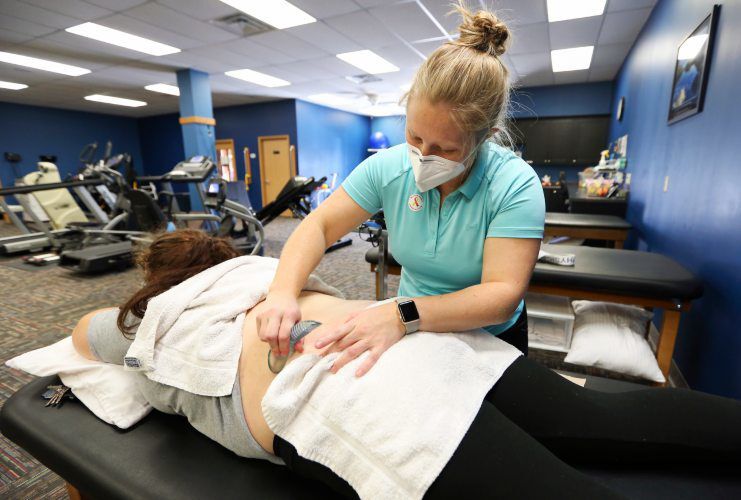An upcoming cut to Medicare reimbursement proposed by the Centers for Medicare and Medicaid Services could force some physical therapy clinics to consider taking fewer Medicare patients, reducing staff or cutting wages.
In the 2021 Medicare Physician Fee Schedule, a 9% cut starting Jan. 1 was recommended for several Part B therapy services, such as physical and occupational therapy. The reimbursement rate is set by the Medicare program and given to medical providers for caring for Medicare beneficiaries.
Area physical therapy clinics have expressed major concerns with how the cuts might affect the upcoming year. Sarah Adams, Unified Therapy Services director of business and operations, said she’s worried that other insurance providers could follow suit with reimbursement cuts, as companies tend to follow Medicare’s lead.
“To have these cuts right now, during this pandemic … that’s going to be more devastating to our facility now so more than ever,” she said.
Currently, Adams said the clinic serves 43 Medicare patients and could lose $1,200 per month based on the proposed cuts. However, these numbers could increase when the new Unified Therapy Services clinic opens on Elm Street.
Kara Takes, Unified Therapy Services rehab director, added that these cuts also are coming right on the heels of COVID-19 recovery. The clinic had to stop seeing in-house patients in March and April, when many hospitals stopped doing elective and nonessential surgeries, and the number of patients has slowly increased since May.
“In October, finally, five months later, we’re finally hitting where we were before the pandemic hit,” Takes said. “Now, two months from now, this Medicare cut is proposed.”
Jason Meyer, owner of Dubuque Physical Therapy, said his clinic has gotten about 85% of its pre-COVID numbers back. At one point, the fear and concern about the coronavirus caused clients to drop by 90%, he said.
About 25% of Dubuque Physical Therapy clients are on Medicare, Meyer said, but he knows other clinics who have about 60% of patients in the program. Due to the proposed cuts, Meyer said clinics across the country will have to consider laying off employees, limiting the care Medicare patients receive or dropping out of the Medicare program altogether to save money.
“Rural areas are probably where it’s really going to have an effect, because there’s much less health care coverage,” he said. “Those practices, especially in Iowa, have a higher ratio of Medicare patients.”
The cuts are intended to offset increased Medicare payments for primary care physicians since COVID-19 began. The Medicare program has a budget neutrality requirement stating that any cost increase in the program means spending must be decreased elsewhere.
Jason Putz, co-owner of Physical Therapy Solutions, said that trying to achieve budget neutrality is a good thing, but not by hurting places like physical therapy clinics.
“You’ve been doing a good thing for a long time, and having the government devalue what you do is pretty heart wrenching,” he said.
While the immediate financial effects of the cut would harm clinics, Putz noted that he’s also concerned that fewer college students will consider physical therapy as a profession if they can’t make enough money both to live and pay off student debt.
“The short-term effect is really devastating, but the long-term effect is even more so, if you ask me,” he said.
Meyer said that organizations like the American Physical Therapy Association have been sending out reminders for physical therapists to contact members of Congress to repeal the cuts. A bipartisan letter was also signed by more than 150 members of the House of Representatives asking the Centers for Medicare and Medicaid Services to delay or mitigate the cuts until an alternative solution can be found.
“Obviously, there has not been any talk at this point with everything else that’s going on, but I think they’re probably going to do it (the cuts),” Meyer said.
Adams, Takes and Putz all said that having patients, as well as staff, contact legislators could also help halt the cuts before Jan. 1.
Takes said many Medicare patients seek physical therapy services for hip or knee surgeries, as well as chronic pain. Potentially having to limit post-surgery treatment for these patients would then limit their ability to function on their own.
“This will affect a lot of people, not just health care providers,” Takes said. “This will affect services they might futuristically need.”


